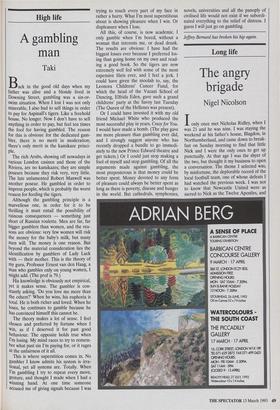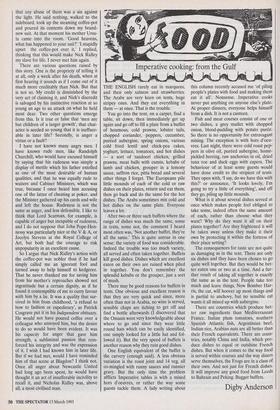Long life
The angry brigade
Nigel Nicolson
Ionly once met Nicholas Ridley, when I was 21 and he was nine. I was staying the weekend at his father's house, Blagdon, in Northumberland, and came down to break- fast on Sunday morning to find that little Nick and I were the only ones to get up punctually. At that age I was the shyer of the two, but thought it my business to open a conversation. The theme I selected was, by misfortune, the deplorable record of the local football team, one of whose defeats I had watched the previous week. I was not to know that Newcastle United were as sacred to Nick as the Twelve Apostles, and that any abuse of them was a sin against the light. He said nothing, walked to the sideboard, took up the steaming coffee-pot and poured its contents down my brand- new suit. At that moment his mother Ursu- la came into the room. 'Good heavens, what has happened to your suit?' I stupidly upset the coffee-pot over it,' I replied, thinking that this would make Nick Ridley my slave for life. I never met him again.
There are various questions raised by this story. One is the propriety of telling it at all, only a week after his death, when at first hearing it sounds as if I come out of it much more creditably than Nick. But that is not so. My credit is diminished by the very act of claiming it, and Nick's discredit is salvaged by his instinctive reaction at so young an age to an attack on what he held most dear. Two other questions emerge from this. Is it true or false that 'men are but children of a larger growth', that char- acter is seeded so young that it is inefface- able in later life? Secondly, is anger a virtue or a fault?
I have not known many angry men. I have known rude men, like Randolph Churchill, who would have excused himself by saying that his rudeness was simply a display of mettle which his father extolled as one of the most desirable of human qualities, and that he was equally rude to waiters and Cabinet Ministers, which was true, because I once heard him accusing one of the latter of cheating at poker, and the Minister gathered up his cards and wife and left the house. Rudeness is not the same as anger, and less defensible. I like to think that Lord Scarman, for example, is capable of anger but incapable of rudeness, and I do not suppose that John Pope-Hen- nessy was particularly nice at the V & A, or Jocelyn Stevens at the Royal College of Art, but both had the courage to risk unpopularity in an excellent cause.
So I argue that Nick Ridley's action with the coffee-pot was nobler than if he had simply called me an ignorant fool and turned away to help himself to kedgeree. That he never thanked me for saving him from his mother's reproaches showed not ingratitude but a certain dignity, as if he found it contemptible of me to curry favour with him by a lie. It was a quality that sur- vived in him from childhood, 'a refusal to bow to fashion or expediency', as Patrick Cosgrave put it in his Independent obituary. He would not have poured coffee over a colleague who annoyed him, but the desire to do so would have been evident. It was his capacity for anger that gave him strength, a subliminal passion that rein- forced his integrity and was the expression of it. I wish I had known him in later life. But if we had met, would I have reminded him of that scene at Blagdon? I think not. Once all anger about Newcastle United had long ago been spent, he would have thought it an act of insufferable incivility to recall it, and Nicholas Ridley was, above all, a most civilised man.



























































 Previous page
Previous page